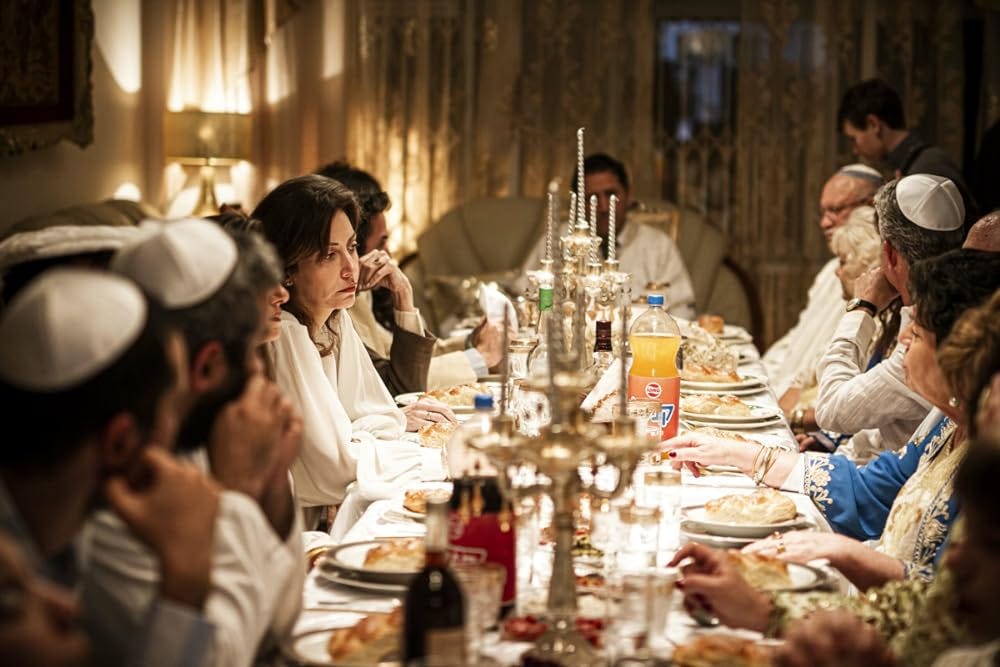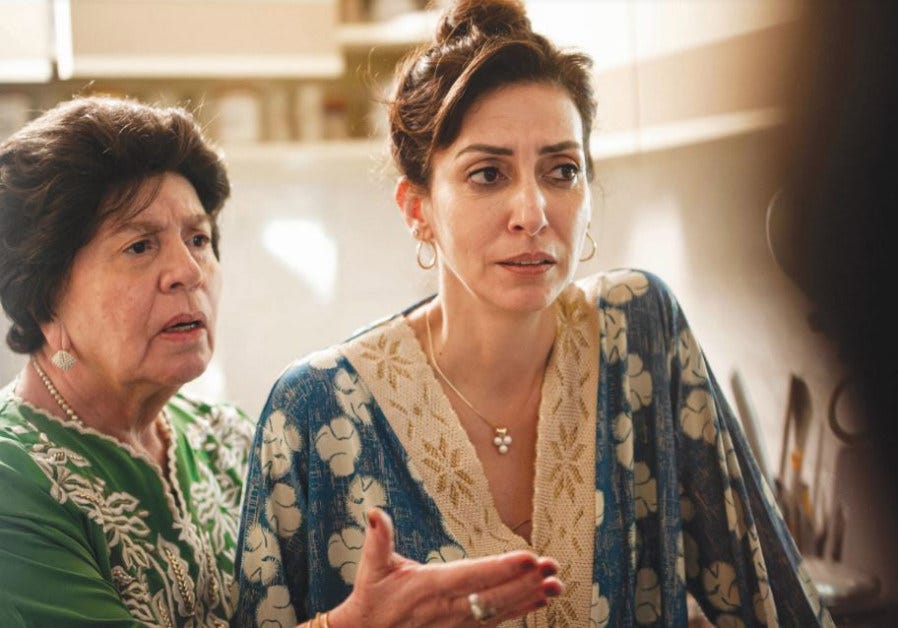Mixed Blessings
How do you promote an Israeli movie in a time of war?
“Before the war,” Eleanor Sela, the cowriter of the Israeli Academy Award-winning film 7 Blessings, told me, “We said that we kidnap the viewers, but we don’t use this word anymore.”
We met on a brisk November morning in a boutique hotel on the Upper West Side, steps away from Broadway, and the Monday-breakfast buzz of business travelers sent us scurrying out of the lobby and into Sela’s cramped hotel room. Sela, along with the film’s director, Ayelet Menahemi, had traveled to New York for a special screening of the film at the Manhattan Jewish Community Center, and for an opportunity to speak with donors who might offer financial support for an Oscar campaign on the film’s behalf.
Sela sat on the bed and I took the desk chair, and once Menahemi got her morning coffee, she kicked off her shoes and took up a spot next to Sela. We were talking about their movie, but we were also discussing the matzav—the situation in Israel, and the complexity of what it might be like, in a moment like this, to be abroad, bantering about moviemaking and Oscar gold when their own attention was mostly back home.
New York, in all its commotion, had been a respite. “We jumped from every noise,” Sela said of their arrival in the U.S. “We came like refugees, really, and we are not even from the south [of Israel]. And then the body is calming down, a little bit, and you feel OK. You can talk.”
7 Blessings begins as a warm family comedy, in which Parisian émigré Marie (Reymonde Amsallem) returns to Israel after a long absence to marry her fiancée Dan (Eran Mor), and to celebrate the weeklong sheva brachot— “seven blessings”—of postnuptial festivities. Marie’s family is warm, loud, and fractious, and each night of sheva brachot is its own unique calamity, marked by public drunkenness and familial bad blood, the festive frenzy masking deep and abiding discord.
The film is an Altman-esque feast of overlapping dialogue, conducted in three languages: Hebrew, French, and a Moroccan Jewish dialect of Arabic. The script presented a deep challenge to the movie’s sound recorders, asked to capture a dozen people all speaking simultaneously in multiple languages. “We talked to them before everything started, and we told them, listen, if you have to leave, right when the shooting ends, to a sanitarium or an asylum, we will pay for it,” said Menahemi. The work was so demanding that the sound recorders demanded a final take done to their specifications, which they called, in contrast with the raucous Moroccan Jewish atmosphere, an “Ashkenazi take.” “The assistant would say OK, one more, Ashkenazi take, and everyone would [mouth] as if they were talking, and only the main dialogue [was audible].”
Menahemi’s mise-en-scene was also influenced by the television work of Jason Katims, in series like Friday Night Lights and Parenthood, where actors were encouraged to roam free (no need to hit particular marks) and deliver their lines in overlapping fashion. “The Moroccan Jewish dinners, they’re multitrack!” Menahemi, who is not Moroccan, enthuses. “16, 20 people talking at one time. It doesn’t bother them. They’re still listening to one another.”
But 7 Blessings is after more than dysfunctional-family humor. The film is based on a story from Sela’s own family, Jewish immigrants from Morocco. Two of Sela’s grandmother’s sisters had each given one of their daughters to their sisters, who were unable to conceive children, to raise. Sela had become a mother herself, and was compelled to tell her family’s story, worrying over a lingering question: “How can it be that such a primal emotion like motherhood is culturally dependent?” Sela summoned her second cousin, and fellow performer and writer, Amsallem to join her in drafting the script.
The two women wrote the script in part by improvising together, particularly enjoying playing out the relationship between Marie’s mother Chana and her sister Grazia, who had been given Marie to raise. “We laughed that, with the low budgets in Israel, until we [raise the money], we will be the age of Chana and Grazia,” said Sela. Writing was a process of small epiphanies, like the moment Sela realized that in a Jewish wedding ceremony, there is a moment when the mother of the bride is called on to drink from the wine goblet. Chana reluctantly takes hold of the wine cup, and summons Grazia to hold it together with her. We have just learned the film’s entire story in its first ten minutes, although we are not yet aware of it.
The film is a deep excavation of Sela’s family history. Family members of Sela’s hauled out nylon bags and suitcases full of unfashionable old clothes belonging to ancestors and allowed the film’s costume designers to select what they needed. Old family photographs also offered inspiration. Sela’s father came to the set to see the production and wound up enthusing about everything on display. “He just went around like in a museum,” said Sela, who also plays Marie’s sister Irit, “saying “Oh, I remember that! This was in this guy’s house!” Past and present, fiction and reality, folded together, and Sela’s father asked her to take a photograph of him with Dayan: “Please [take] a photo with my mom.”
The movie was intended by Sela as a tribute to Moroccan Jewish culture: “Reymonde and I really felt it was like a love letter to those people, to those languages, to those smells and tastes. I think in one generation, you won’t have people that will [speak the] Moroccan Jewish language. I don’t know if there will be enough people that know how to do those salads.”
7 Blessings won best picture and nine other prizes at the Israeli Academy Awards, which automatically makes it Israel’s entry for Best International Film at the Oscars. The filmmakers were riding high for a few weeks—until October 7, when Hamas militants breached the border with Gaza, murdered more than 1,200 people, and kidnapped another 240. “It wasn’t like we were sad for the film,” said Menahemi about the aftermath of the attacks. “It felt like it was being buried, because who cared by then?”
The film itself was changed by this new, unwanted context. “The caftan, the Moroccan dress, for me, it’s a dress of celebration,” said Sela. “And suddenly, we saw a video of a kidnapped woman dressed up with a caftan. And I said, ‘Oh my god, so from now on, until they will come back, this is no longer a [celebratory] dress, it’s a horrible dress for me now.”
“There’s no one in Israel who doesn’t know at least one [person] who died, and many more, usually,” said Menahemi. “I think Israelis are practically shattered, and it doesn’t matter what you believe, if you’re from the left or the right or the middle, it doesn’t matter. It’s like Israelis are connected [with] invisible cords, and if something terrible happens to so many people in Israel, then everybody is affected.” Menahemi and her husband are childless by choice, and both of her parents died about ten years ago, and she found herself surprised to feel a dreadful form of relief at having neither parents nor children to have to worry about in this moment.
A few weeks after the attacks, the filmmakers and actors were asked to travel to the kibbutz of Shefayim, where survivors from another kibbutz, Kfar Aza, had been staying at a hotel. More than fifty members of the kibbutz had been murdered, more than twenty were missing, and the hotel’s lawn was dotted with tents, each containing another Kfar Aza family. The 7 Blessings team met the widow of Tal Elon, the civil-security officer at the kibbutz, who had been murdered on October 7. Liora Elon asked for a copy of the movie, and wound up writing a letter to Sela, thanking her for the respite from her grief. She described waking up at five-thirty in the morning, “with enormous pain,” and starting the movie, assuming she would only make it through a few minutes before needing to turn it off. “I am grateful to you,” she wrote after watching the entire film, “for the respite you allowed me from my pain.” The story of a fractious but loving family registers differently for Israeli viewers than it might have prior to October 7.
Elon and the other survivors asked the 7 Blessings crew to bring the Oscar back to Kfar Aza. “This was the moment that Ayelet and I decided to come,” said Sela. “We have a mandate to go and represent Israel in the Oscars. And this is something that, with all the hyperactivity in Israel, nobody else can do,” said Menahemi. “This is something that only we can do. I was never patriotic, but now I am. We choose to do it for Israel, because we can do it for Israel.” [Last month’s announcement of finalists in the international-film category did not include 7 Blessings among its ten selections.]
After the war started, the Foreign Ministry had informed the filmmakers that they were pulling funding for their Oscar campaign, but even prior to October 7, the government of Prime Minister Benjamin Netanyahu had been hostile to culture. “Let’s say they were doing the minimum and not more than that,” said Menahemi. The filmmakers’ patriotism is much more about the valor and decency of ordinary Israelis, and not the government or security services, who failed to anticipate the Hamas attacks. “We all didn’t want this government,” said Sela. “We don’t agree with anything they do. We strike against them.”
The movie is about someone seeking answers, and possibly revenge, for the misdeeds of the past, and in dredging up these ancient emotions—of remorse and love and grief and anger and confusion—7 Blessings offers forgiveness as the only consolation. This forgiveness has taken on a different meaning in the weeks since October 7, and even Sela struggles with her own prescription. “I wrote those words: ‘Just look into yourself and you will find the forgiveness.’ But I can’t find forgiveness now. I don’t even know if I want to find forgiveness for murder and kidnapped babies and women and men. I don’t know. But the film became a compass to what it should be. Because we really want to live with peace and forgiveness. But for the meantime? We can’t forgive [now]. I don’t know if we should.”
“This is what Marie has to do,” says Menahemi. “She was seeking justice. You’ll never get it. You’ll never really get it. It’s a lose-lose situation, when it’s so deep and complex and you can’t even trace it back to the roots, so the only way is just to continue, and that’s by forgiving.”




Excellent piece!